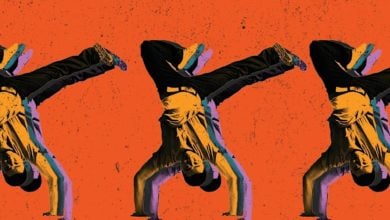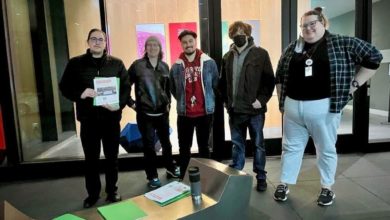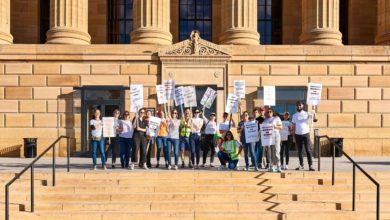“Serve the People” was a popular slogan and core principle of the People’s Liberation Army that led the Chinese Revolution. It served as a call for revolutionaries to work and struggle not for personal self-interest but for the masses of poor and oppressed people.
While the slogan first emerged in a very different time and place—in the context of civil war—for more than a decade it has been the guiding principle for Los Angeles-based Filipino emcee Bambu. With his music and community organizing, Bambu too has been at war with imperialism, police brutality, capitalism and patriarchy—promoting revolution and serving the people. He makes music to bump at a march against war or police brutality, for progressive educators to play to their students, and to inspire disenfranchised youth to fight back.
‘One Rifle Per Family’
Born and raised in the Watts community in Los Angeles, Bambu is one of the pioneers of a Filipino-American progressive hip-hop scene that has expanded its reach in recent years. That scene includes Seattle-based artist Prometheus Brown and Bay Area native Rocky Rivera, both of whom are featured in the album. Bambu recently spoke to Liberation about his latest—and he claims his last—album, “One Rifle Per Family.”
While many albums these days are really disjointed collections of singles, this is, in classic hip-hop fashion, a concept album. In this case, the theme is the empowerment and self-organization of working-class and oppressed communities. Bambu explained, “The rifle is a symbol of protection,” and there are a lot of things from which poor and working-class families need to protect themselves: from foreclosures and evictions to racism and police brutality.
Right off the bat, the first track “Bronze Watch” captures the listener with a beat that fuses the sounds of Southeast Asia—bringing in Kulintang gongs—with a hip-hop rhythm that marches directly into an acidic first verse about the system trapping young people into senseless violence. Moments later, he has switched into Tagalog, but carrying on with the same flow and determination—those who aren’t versed in the language of the Philippines will bop to it nonetheless.
Song after song plays like chapters of a single story, a family fighting back in a world of injustice. From tracks commemorating historic labor struggles (“Orosi”) to others exposing the racist police state (“Pepper Spray”), “One Rifle Per Family” fulfills its mission. It serves the people with an hour of good music, exceptional lyrics, and critical content.
In “Moms,” which goes through several mid-song beat changes, Bambu uses his mother’s story to talk about women’s oppression and patriarchy that dominate families, hip hop and society as a whole. The song echoes themes raised in “The Queen is Dead,” a timely song from Bambu’s previous album about how some superficial pro-women references in “progressive” circles can mask traditional patriarchy.
It is only too fitting when Bambu passes the mic to his mother. Not to be outdone by her always political son, she uses the occasion to ridicule the LAPD’s “Serve and Protect” slogan: “You are there to abuse… To them, all suspects are guilty until proven innocent.”
Bambu has never shied from talking about his past. A veteran of both the L.A. gang scene and the U.S. military, the unjust wars in the streets and abroad remain a consistent theme in his music. In “Upset the Setup,” joined by Atlanta-based Killer Mike, Bambu calls for gangs to become vehicles for revolution. “I appreciate gangs and understand their existence,” Bambu explained to Liberation, calling his music “Gangsta Rap” of a different kind. Instead of youth killing each other over petty turf wars—an image in which the corporate media and music companies revel—such organizations of the youth can be politicized and pointed towards the real enemy.
Before the curtain falls, and Bambu says goodbye, he pays tribute to the city of Los Angeles in “Where you from.” The song pays homage to the bad and the good of the city, the conditions that shaped Bambu’s life, the realities of poverty, unemployment, gang violence and police terror. He thanks his city for grooming him but at the same time shows the scars it left.
Artist and organizer
In “I Beg of You” Bambu calls on his fans and people to “Stop, listen, and build.” In a sense breaking with convention for a “conscious” hip-hop song, Bambu draws out that consciousness alone is not sufficient without concrete organizing. One verse draws out this theme:
Very rarely do the poor get opportunities like this
to speak in front of thousands of kids and they listen and shit.
I run into ‘em at the Seafood City, they catch me at the Jollybee
and tell me they find a little pride in what I speak
I just I tell ‘em “I’m the same. My momma’s still ride the bus
My uncle’s still smoking stuff, My credit’s still fucked up.”
That’s the beginning of groundwork, building on that face-to-face
and not just on that Facebook, organizing on a Twitter page
Hey, I’m the same, I speak that shit when I’m on stage,
but if you knew me, you would know I organize in LA.
Cuz I do recognize that music ain’t no genuine change
Merely a way to raise the way you thought the game got played
So if you thinking about shit critically: Stop, listen and build.
Don’t just grab a picket sign when that next boy killed.
It go beyond a conscious rap song, and I’m out in the field.
Rappin’ cool — but words never break bones, you feel?
And Bambu walks the walk, frequently marching and performing at various anti-war and police brutality demonstrations. He has served as an organizer in Kabataang maka-Bayan/Pro-People Youth, a Filipino youth organization based in the United States that organizes for social justice while promoting Filipino culture and history.
This writer first heard Bambu in early 2009, during the U.S.-backed Israeli massacre in Gaza, when he released “When Will the Time Come.” As my comrades and I, along with thousands across the country, mobilized to protest the gruesome siege and educate those around us about the need to support Palestine, the song became an anthem that affirmed our work. The chorus spelled out the urgency and special responsibility of people in the United States to take up the Palestinian cause: “They dropping bombs over Gaza / Missiles in the sky say ‘U.S.A’ on the side.”
When asked about his next moves after this album, Bambu explained that while he still plans to make music, he wants to focus more on his family and organizing in his community.
For years, Bambu’s music has provided a real-time soundtrack of the movement. If this is indeed his last full LP, his revolutionary albums will be missed. But regardless, he leaves an important legacy to inspire artists to “serve the people” and advance the struggle in both their aesthetic contributions and as organizers.




